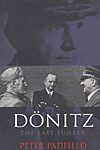 Cassell, 2001, $24.95, ISBN 0-304-35870-3, 534 pages, trade paperback
Cassell, 2001, $24.95, ISBN 0-304-35870-3, 534 pages, trade paperback
This biography of Grand Admiral Donitz, first published in 1984, portrays the man who would succeed Hitler as the consummate military professional ultimately corrupted by power. From birth to death Donitz is a Navy officer, though with each promotion he came closer to Hitler and the ruling Nazi elite, and thus slowly edged closer to the line between professionalism and political expediency.
Of particular note is the convergence of historical fact with Donitz’s own memoirs. Padfield does an admirable job of pointing out discrepancies and filling in details ignored or glossed over. Thus, the biography conveys a critical eye on his behavior and orders, steering a balanced course between sympathy and condemnation.
However, it is interesting to note that the opening preface to the book thanks Donitz's daughter and niece for their help, and then apologizes to them because he expects his work to "hurt" them. Padfield chose a theme of power corrupting, and makes no apologies for it.
Yet to dismiss Donitz as just another Nazi is to do him a disservice. He was, first and foremost, a dedicated officer. Born in 1891, he possessed a fine intellect and passed the entrance exam-and the social status requirement-and entered the Kniserliche Marine academy as a Sea Cadet in 1910. Here Padfield delves into the fabric of the German Imperial Navy and the effect in the formulative years of a new cadet. This continues through to World War I and ultimate defeat. By then, Donitz’ basic foundation to duty, even through the mutiny, cements in his soul. Like many others, he joined the FreiKorps, although remaining in the Navy and rising up the ranks based on an excellent duty record and dedication to rebuilding Germany and its Navy. Padfield’s inclusion of service evaluations is especially good and the commentary recounts Donitz’s ardor.
By 1935, Donitz was Commander of the first U-boat flotilla, and his ideas of how to use the arm in times of war are explored in detail. The genesis of wolf pack tactics are formed, in part based on his WWI U-boat experience and his post-war torpedo-boat (destroyers) experience. U-boat training leads to ideas on “trade war” otherwise known as attacks on merchantmen.
Through WWII, Donitz’s handling of U-boats receives a thorough examination. It is clear that the Allied technological advances and tactical adjustments make the Atlantic increasingly dangerous for U-boats. Ultra intercepts, radar, and increased air coverage doom Donitz’s war of attrition strategy.
And yet, his personality and optimism--though some say fantasies--of victory endear him to Hitler. Politically deft at deflecting blame, he gains the Fuhrer’s confidence and ultimately, his position as Grand Admiral and then heir. By then, the war is clearly lost, but his optimism perseveres. When Hitler commits suicide, Donitz became Fuhrer.
Padfield handles the Nuremberg War Trials with aplomb, and here treads that fine line. Did Donitz order U-boat officers to machine gun survivors of sunken merchant ships? Did he use slave labor in U-boat production? Just how close was he to Himmler and the murderous concentration camps?
The answers are not black and white, but varying grays, although Padfield tends to choose darker hues. Padfield pieces together likely explanations by collating numerous sources--from transcripts, recollections, and official records--and joins them with the character study that’s been going on throughout the book. The end result is 10 years in Spandau prison, but the pages of discovery are well documented and well told.
Donitz died Christmas Eve, 1980.
All in all, this evaluation of the life of Donitz brings clarity to a viewpoint not often seen, and information about a person often ignored.
A Postscript updates the 1984 work with corrections and criticisms, some from former U-boat officers, others form Padfield himself. Of note is Peter Hansen, who contributes to Sharkhunter’s KTB magazine, and his observations about Donitz’s character and the controversy over shooting sailors from sunk ships.
Back to List of Book Reviews: World War II
Back to Master List of Book Reviews
Back to Master Magazine List
© Copyright 2001 by Coalition Web, Inc.
This article appears in MagWeb (Magazine Web) on the Internet World Wide Web.
Other military history articles and gaming articles are available at http://www.magweb.com